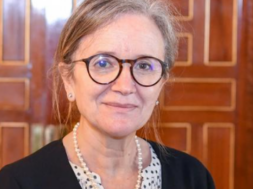
Roving Periscope: Tunisia has the Arab world’s first woman PM
Virendra Pandit
New Delhi: The “Arab Spring” may have gradually blossomed into the introduction of some democracy and gender equality in the conservative Muslim world. North African country, Republic of Tunisia, where this change of season started in the early 2010s, now has the first woman Prime Minister in the Arab world.
The pro-democracy movement, which sparked veritable political upheavals across the Arab nations, was a series of anti-government protests, uprisings, and armed rebellions. It spread across much of the Middle East in the early 2010s, beginning against corruption and economic stagnation. It was influenced by the Tunisian Revolution.
At that time, its flowers were suppressed. But seeds remained buried and have regerminated. In the meantime, the Arab world has seen several minor, localized revolutions, including the Arab-Jewish ‘bonhomie’ amid soaring Turkish ambitions, and the Saudis announcing some relaxations and women-friendly measures.
Once again, Tunisia has taken the lead. On Wednesday, its President Kais Saied appointed Najla Bouden Romdhane, the 63-year-old professor of geology, as the Arab world’s first woman PM.
The professor, a politically unknown person, is likely to remain a rubber stamp of the President for some time. Nevertheless, a beginning has been made.
Reacting to the development, Romdhane tweeted: “I am honored to be the first woman to hold the position of prime minister in Tunisia. I will work to form a coherent government to face the country’s economic difficulties, fight corruption, and respond to the demands of Tunisians regarding their natural rights to transport, health, and education.”
Last week, the President, seen as a strongman, had announced that he would begin to act by decree, select a new Cabinet and start to revamp Tunisia’s hard-won 2014 constitution via a committee that he would appoint himself. Under the decree, he also has the power to appoint the PM. Romdhane is the first person he has appointed since, media reported on Friday.
Mixed reactions have followed her appointment.
Former Human Rights Minister Samir Dilou commented on Facebook: “The decision deserves praise. Is it really a historic moment? Unfortunately not, the symbolism of appointing a woman to this “high” position coincides with the suspension of the constitution and the uniqueness of the president of the republic with pharaonic powers”.
Some women’s organizations were even more outspoken in their disbelief in Romdhane’s political scope.
“The message that is screaming at us is “a woman only gets the job when the job is not important anymore.” It would have been a different story if he appointed her instead of Mechichi or Fakhfakh,” Fida Hammami, the Middle East and North Africa advocacy coordinator at the Women’s International League for Peace and Freedom wrote on Twitter, media reports said.
President Saied had grabbed all emergency powers on July 25 and dismissed then-PM Hichem Mechichi, who, as the successor of Elyes Fakhfakh, lasted barely a year in power.
In Tunisia’s capital Tunis, the opinions vary among women about their new PM. “I am very happy with this appointment, based on the principle of feminist solidarity. The first Arab woman in this position is positive; previously, the position was reserved for men,” Olfa Karamosli, a Tunis-based employee, said.
However, some said the president should have appointed a strong man of confidence and integrity, who knows the needs of the people and has the ability to lead the government. “That is because women are always in a position of weakness, and Romdhane cannot be strong against some people.”
Romdhane will be Tunisia’s 10th PM since the 2011 uprising that ousted long-time President Zine El Abidine Ben Ali. Ever since, Tunisia has been at the forefront of Arab countries in terms of women’s rights, granting women full legal equality, ending polygamy, and granting them the right to marry non-Muslims or dress as they thought fit.
However, President Saied has not been known as a women’s advocate. Recently, he rejected a bill on women being able to inherit.
“Saied is a very conservative politician and outspoken against the LBGT community, human rights or youth rights. But despite the skepticism, it is really important to point out that, overall, it is a wonderful step for Arab women that a woman is the new Tunisian PM.”













